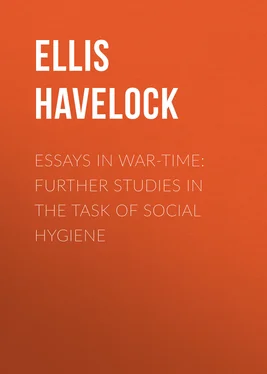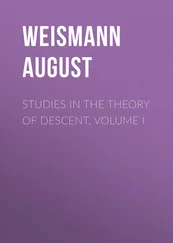Havelock Ellis - Essays in War-Time - Further Studies in the Task of Social Hygiene
Здесь есть возможность читать онлайн «Havelock Ellis - Essays in War-Time - Further Studies in the Task of Social Hygiene» — ознакомительный отрывок электронной книги совершенно бесплатно, а после прочтения отрывка купить полную версию. В некоторых случаях можно слушать аудио, скачать через торрент в формате fb2 и присутствует краткое содержание. Жанр: psy_sex_and_family, foreign_psychology, foreign_edu, на английском языке. Описание произведения, (предисловие) а так же отзывы посетителей доступны на портале библиотеки ЛибКат.
- Название:Essays in War-Time: Further Studies in the Task of Social Hygiene
- Автор:
- Жанр:
- Год:неизвестен
- ISBN:нет данных
- Рейтинг книги:5 / 5. Голосов: 1
-
Избранное:Добавить в избранное
- Отзывы:
-
Ваша оценка:
- 100
- 1
- 2
- 3
- 4
- 5
Essays in War-Time: Further Studies in the Task of Social Hygiene: краткое содержание, описание и аннотация
Предлагаем к чтению аннотацию, описание, краткое содержание или предисловие (зависит от того, что написал сам автор книги «Essays in War-Time: Further Studies in the Task of Social Hygiene»). Если вы не нашли необходимую информацию о книге — напишите в комментариях, мы постараемся отыскать её.
Essays in War-Time: Further Studies in the Task of Social Hygiene — читать онлайн ознакомительный отрывок
Ниже представлен текст книги, разбитый по страницам. Система сохранения места последней прочитанной страницы, позволяет с удобством читать онлайн бесплатно книгу «Essays in War-Time: Further Studies in the Task of Social Hygiene», без необходимости каждый раз заново искать на чём Вы остановились. Поставьте закладку, и сможете в любой момент перейти на страницу, на которой закончили чтение.
Интервал:
Закладка:
IV
MORALITY IN WARFARE
There are some idealistic persons who believe that morality and war are incompatible. War is bestial, they hold, war is devilish; in its presence it is absurd, almost farcical, to talk about morality. That would be so if morality meant the code, for ever unattained, of the Sermon on the Mount. But there is not only the morality of Jesus, there is the morality of Mumbo Jumbo. In other words, and limiting ourselves to the narrower range of the civilised world, there is the morality of Machiavelli and Bismarck, and the morality of St. Francis and Tolstoy.
The fact is, as we so often forget, and sometimes do not even know, morality is fundamentally custom, the mores , as it has been called, of a people. It is a body of conduct which is in constant motion, with an exalted advance-guard, which few can keep up with, and a debased rearguard, once called the black-guard, a name that has since acquired an appropriate significance. But in the substantial and central sense morality means the conduct of the main body of the community. Thus understood, it is clear that in our time war still comes into contact with morality. The pioneers may be ahead; the main body is in the thick of it.
That there really is a morality of war, and that the majority of civilised people have more or less in common a certain conventional code concerning the things which may or may not be done in war, has been very clearly seen during the present conflict. This moral code is often said to be based on international regulations and understandings. It certainly on the whole coincides with them. But it is the popular moral code which is fundamental, and international law is merely an attempt to enforce that morality.
The use of expanding bullets and poison gases, the poisoning of wells, the abuse of the Red Cross and the White Flag, the destruction of churches and works of art, the infliction of cruel penalties on civilians who have not taken up arms—all such methods of warfare as these shock popular morality. They are on each side usually attributed to the enemy, they are seldom avowed, and only adopted in imitation of the enemy, with hesitation and some offence to the popular conscience, as we see in the case of poison gas, which was only used by the English after long delay, while the French still hesitated. The general feeling about such methods, even when involving scientific skill, is that they are "barbarous."
As a matter of fact, this charge of "barbarism" against those methods of warfare which shock our moral sense must not be taken too literally. The methods of real barbarians in war are not especially "barbarous." They have sometimes committed acts of cruelty which are revolting to us to-day, but for the most part the excesses of barbarous warfare have been looting and burning, together with more or less raping of women, and these excesses have been so frequent within the last century, and still to-day, that they may as well be called "civilised" as "barbarous." The sack of Rome by the Goths at the beginning of the fifth century made an immense impression on the ancient world, as an unparalleled outrage. St. Augustine in his City of God , written shortly afterwards, eloquently described the horrors of that time. Yet to-day, in the new light of our own knowledge of what war may involve, the ways of the ancient Goths seem very innocent. We are expressly told that they spared the sacred Christian places, and the chief offences brought against them seem to be looting and burning; yet the treasure they left untouched was vast and incalculable and we should be thankful indeed if any belligerent in the war of to-day inflicted as little injury on a conquered city as the Goths on Rome. The vague rhetoric which this invasion inspired scarcely seems to be supported by definitely recorded facts, and there can be very little doubt that the devastation wrought in many old wars exists chiefly in the writings of rhetorical chroniclers whose imaginations were excited, as we may so often see among the journalists of to-day, by the rumour of atrocities which have never been committed. This is not to say that no devastation and cruelty have been perpetrated in ancient wars. It seems to be generally agreed that in the famous Thirty Years' War, which the Germans fought against each other, atrocities were the order of the day. We are constantly being told, in respect of some episode or other of the war of to-day, that "nothing like it has been seen since the Thirty Years' War." But the writers who make this statement, with an off-hand air of familiar scholarship, never by any chance bring forward the evidence for this greater atrociousness of the Thirty Years' War, 15 15 In so far as it may have been so, that seems merely due to its great length, to the fact that the absence of commissariat arrangements involved a more thorough method of pillage, and to epidemics.
and one is inclined to suspect that this oft-repeated allusion to the Thirty Years' War as the acme of military atrocity is merely a rhetorical flourish.
In any case we know that, not so many years after the Thirty Years' War, Frederick the Great, who combined supreme military gifts with freedom from scruple in policy, and was at the same time a great representative German, declared that the ordinary citizen ought never to be aware that his country is at war. 16 16 Treitschke, History of Germany (English translation by E. and C. Paul), Vol. I., p. 87.
Nothing could show more clearly the military ideal, however imperfectly it may sometimes have been attained, of the old European world. Atrocities, whether regarded as permissible or as inevitable, certainly occurred. But for the most part wars were the concern of the privileged upper class; they were rendered necessary by the dynastic quarrels of monarchs and were carried out by a professional class with aristocratic traditions and a more or less scrupulous regard to ancient military etiquette. There are many stories of the sufferings of the soldiery in old times, in the midst of abundance, on account of military respect for civilian property. Von der Goltz remarks that "there was a time when the troops camped in the cornfields and yet starved," and states that in 1806 the Prussian main army camped close to huge piles of wood and yet had no fires to warm themselves or cook their food. 17 17 Von der Goltz, The Nation in Arms , pp. 14 et seq. This attitude was a final echo of the ancient Truce of God. That institution, which was first definitely formulated in the early eleventh century in Roussillon and was soon confirmed by the Pope in agreement with nobles and barons, was extended to the whole of Christendom before the end of the century. It ordained peace for several days a week and on many festivals, and it guaranteed the rights and liberties of all those following peaceful avocations, at the same time protecting crops, live-stock, and farm implements.
The legend, if legend it is, of the French officer who politely requested the English officer opposite him to "fire first" shows how something of the ancient spirit of chivalry was still regarded as the accompaniment of warfare. It was an occupation which only incidentally concerned the ordinary citizen. The English, especially, protected by the sea and always living in open undefended cities, have usually been able to preserve this indifference to the continental wars in which their kings have constantly been engaged, and, as we see, even in the most unprotected European countries, and the most profoundly warlike, the Great Frederick set forth precisely the same ideal of war.
The fact seems to be that while war is nowadays less chronic than of old, less prolonged, and less easily provoked, it is a serious fallacy to suppose that it is also less barbarous. We imagine that it must be so simply because we believe, on more or less plausible grounds, that our life generally is growing less barbarous and more civilised. But war, by its very nature, always means a relapse from civilisation into barbarism, if not savagery. 18 18 It is interesting to observe how St. Augustine, who was as familiar with classic as with Christian life and thought, perpetually dwells on the boundless misery of war and the supreme desirability of peace as a point at which pagan and Christian are at one; "Nihil gratius soleat audiri, nihil desiderabilius concupisci, nihil postremo possit melius inveniri … Sicut nemo est qui gaudere nolit, ita nemo est qui pacem habere nolit" ( City of God , Bk. XIX., Chs. 11-12).
We may sympathise with the endeavour of the European soldiers of old to civilise warfare, and we may admire the remarkable extent to which they succeeded in doing so. But we cannot help feeling that their romantic and chivalrous notions of warfare were absurdly incongruous.
Интервал:
Закладка:
Похожие книги на «Essays in War-Time: Further Studies in the Task of Social Hygiene»
Представляем Вашему вниманию похожие книги на «Essays in War-Time: Further Studies in the Task of Social Hygiene» списком для выбора. Мы отобрали схожую по названию и смыслу литературу в надежде предоставить читателям больше вариантов отыскать новые, интересные, ещё непрочитанные произведения.
Обсуждение, отзывы о книге «Essays in War-Time: Further Studies in the Task of Social Hygiene» и просто собственные мнения читателей. Оставьте ваши комментарии, напишите, что Вы думаете о произведении, его смысле или главных героях. Укажите что конкретно понравилось, а что нет, и почему Вы так считаете.












